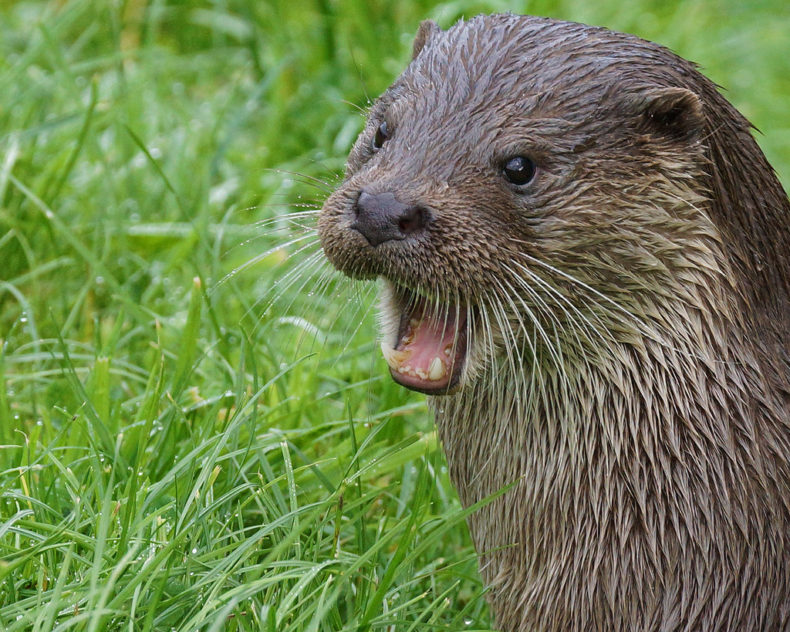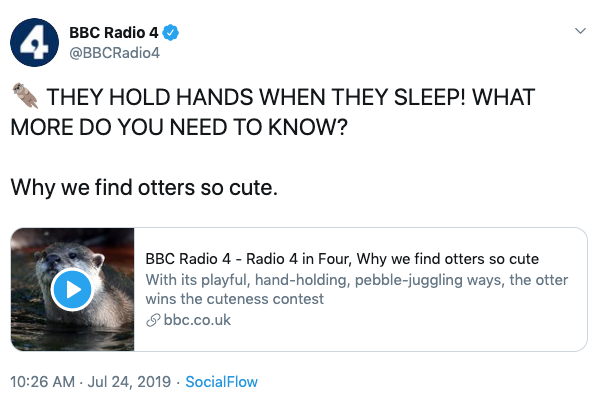
Last year, my husband and I set off on a camping adventure in Montana. We canoed to a remote site on Cliff Lake, an expanse of water that formed atop a geologic fault. The sun shone. The water was an impossible shade of aquamarine. Eagles perched atop dead trees. It was pretty damn perfect.
That evening, after we pitched our tent, we took the canoe out for an evening paddle. Not fifty feet from our site, I spied something in the water. Something brown. Something furry. Something mammalian. It took my brain two more oar strokes to ID the animals. Otters! Three of them. Playing in the water near a large rock. I had never seen otters in the wild. Even spotting otters at the zoo had proven surprisingly challenging. Yet, here we were, gazing upon otters in their native habitat.
I was awestruck. My husband and I aren’t the kind of people who hold hands, but had we not been at opposite ends of the canoe, we might have clutched our palms together and gazed meaningfully into each other’s eyes.
When we got back to civilization, we couldn’t wait to tell our friends. “Otters!” we cried. “In the lake! So close!”
The friends didn’t share our excitement. “You’re lucky,” one said, frowning. “There have been all kinds of otter attacks around here.”
There are words that go together. Peanut butter and jelly. Football and tailgating. Air and plane. But otter attack? No. I couldn’t believe it. Otters are playful! Otters are mischievous! Otters are adorable! Otters do not attack.
Google told a different story. In 2013, four otters drowned an 80-pound black lab in Echo Lake. That same year, an otter attacked a tuber on the Madison River. The incident left the woman with a broken hand, torn ligaments and tendons, and a bevy of bites and scratches. “It just kept biting me, that was the scariest part,” she said. A year later, two otters attacked a boy who was swimming in Lake of the Woods. In 2017, a triathlete was attacked while he was swimming in Cliff Lake, the very same lake where I spotted otters. That same year, another otter bit a tuber on the Missouri River. Last year, otters attacked two families on the Jefferson River. The list goes on. And that’s just Montana.
According to a 2011 study, most otter attacks happen in Florida. Let’s examine a recent case: Sue Spector was kayaking down a river in western Florida when she spotted an otter behind her. “I thought ‘Oh this is a cute otter,’” she told the Tampa Bay Times, “and all of the sudden he jumped on the back of the kayak and lunged at me.” She tried to pry the animal off the kayak, the kayak flipped, and the otter attacked Spector, who began beating it with her paddle. Eventually she hopped on her guide’s kayak and they raced away.
Now, I could go off on a rant here about otters being vicious scumbags. But the problem isn’t that otters are objectively vicious. They aren’t. Ecologists will tell you that otter attacks are rare, and that otters generally try to avoid humans. The problem is we’ve been conditioned to think of otters as adorable living stuffies. So any amount of viciousness seems like a betrayal.
And who is to blame for this bad casting? Well, let’s start with Disney. Remember the adorable otters from Finding Dory? (Yes, I know they were sea otters. Will you let me finish?) The otters that made themselves so cuddly they stopped traffic? They didn’t help matters.
And surely the media deserves some blame. On Wednesday, BBC Radio 4 tweeted a piece about otters with this message: “THEY HOLD HANDS WHEN THEY SLEEP! WHAT MORE DO YOU NEED TO KNOW?”

What more do I need to know? Um, maybe that they sometimes attack? Maybe that I shouldn’t row up close to snap a pic of their cute clasped “hands”? Just a thought.
But mostly we should blame ourselves for buying into this crap, for buying t-shirts that say “Otters are my spirit animal” and watercolor paintings of otters holding hands. For buying cards that say, “you are my significant otter” and socks that feature cartoon otters holding hands. For putting otters in bonnets and then posting pictures online.
Otter attacks are our comeuppance, the price we must pay for our relentless insistence on anthropomorphizing wild animals. Otters do not exist for our edification. They did not ask to be born adorable. They aren’t always playful or inquisitive. Sometimes they are scared and aggressive and, yes, even dangerous. And maybe if we could stop mooning over their wee furry faces, we might be a bit more prepared for their wildness. Their savagery. Their otterness.
And if you must squeal at their cuteness, keep far away from the water.